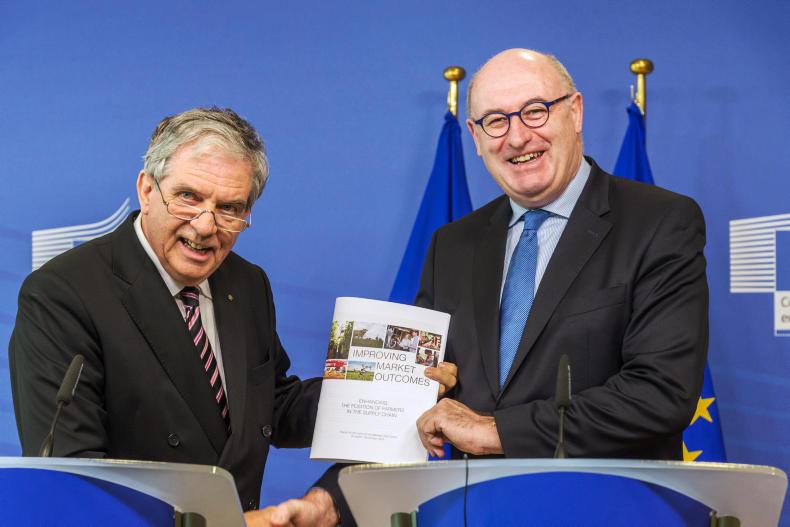In its report presented to European Agriculture Commissioner Phil Hogan this Monday, the task force recommends intervention by the EU to “introduce or enhance mandatory price reporting as a means to increase the transparency of prices especially in the meat, fruit and vegetables and dairy sectors”.
The report adds that data from price reporting by processors, wholesalers and retailers should be made widely available online. The Commission should also crunch the numbers to calculate indicators such as a “food euro” – revealing how much goes to each player in the food chain out of a euro spent by consumers on a typical food product.
A lack of knowledge about prices and costs at the different stages of the chain undermines farmers’ trust in the supply chain
A further suggestion would be to include farm inputs in the price monitoring system.
“Currently, a lack of knowledge about prices and costs at the different stages of the chain undermines farmers’ trust in the supply chain,” wrote the authors of the report – a group of 12 academics and industry representatives along the food chain chaired by former Dutch Agriculture Minister Cees Veerman.
“A system in which processor prices are also reported would provide redress and allow insight into price transmission and formation along the whole chain,” they added. “The approach could make it possible to link the value of a product to the price it eventually fetches further downstream. It could help address possible misperceptions and help explain the difference between producer and retail prices.”
Aggregated data
The task force stops short of asking each factory to publish its prices and margins. Instead, “dissemination of the collected information would have to be undertaken at the aggregate level though so as to protect business confidentiality”.
One example, from the Irish context could be the Purchase Price Index (PPI), which reflects the price of dairy commodities exported by Ornua. The report essentially recommends to build upon such existing initiatives to publish more detailed, standardised data across all food products.
US example
The task force conducted research and consultations across the industry, and draws largely from the US experience on price reporting. It found that since 1999, US food processors have been “required to report electronically the price of each sale, along with quantity, and other characteristics (eg type of sale, item description and destination) that is used to produce timely, meaningful market reports”.
The US Department of Agriculture uses the data to publish a range of statistics including the price of wholesale meat and dairy products.
Adjudicator
The task force calls for clearer legislation on the rules, allowing farmers to form producer organisations and negotiate with buyers.
It also recommends that all EU member states appoint an adjudicator to police the food chain and hear complaints of unfair trading practices, with minimum EU-wide standards such as a maximum 30-day payment term and a ban on upfront payment to secure contracts and contributions to promotional costs.
This service already exists in the UK and Irish farming organisations have been calling for a similar “food ombudsman” to be established here.
CAP reform
In the longer term, the task force recommends that the CAP post-2020 moves away from direct payments and focuses on measures to protect farmers from risks including price volatility.
Accepting the report in Brussels, Commissioner Hogan said it would be discussed at a high-level European forum on the functioning of the food chain to be held on 15 December, to see which recommendations could be implemented. The European Parliament will also examine the report’s recommendations.
Farming organisations have welcomed the publication of the report. The EU-wide umbrella group COPA-COGEC was especially supportive of the recommendation to legislate against unfair trading practices at the European level "so that operators are sanctioned when they break EU law. An independent third party ombudsman must impose sanctions whenever there is non-compliance,” said COPA-COGECA secretary general Pekka Pesonen.
However, he added that the price transparency mechanisms should be extended to other sectors including sheep meat, cereal and potatoes. He also called for direct CAP payments to remain as the "main income stabilising tool for farmers".
In Ireland, the IFA welcomed the report, highlighting the price transparency and adjudicator proposals. The ICSA was also positive, but warned that the recommendations do not go far enough, calling for full transparency over the profits made by multinational retailers and processors and competition law reform to allow produced groups to organise on a larger scale.
The relentless pressure that prices are having on producers and conditions of sale cannot continue without negative consequences for producers and consumers
Irish MEP and European Parliament vice-president Mairead McGuinness noted that while the report was commissioned by Agriculture Commissioner Phil Hogan, implementation of its recommendations would fall with Internal Market Commissioner Elzbieta Bienkowska, who has so far not favoured EU regulation of the food chain.
Following last June's European Parliament vote in favour of such regulation, McGunness said that "the relentless pressure that prices are having on producers and conditions of sale cannot continue without negative consequences for producers and consumers".
